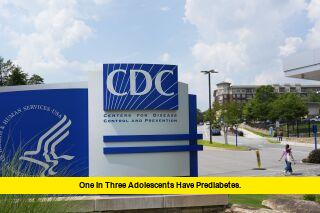The CDC has revealed a concerning surge in youth health issues, reporting that one in three adolescents have prediabetes in the United States. This dramatic rise in prediabetic conditions among teens is sparking urgent calls from healthcare leaders, schools, and families to take immediate action to reverse the trend.
One in Three Adolescents Have Prediabetes: What the New Data Reveals
The latest government health survey shows that approximately 8.4 million adolescents aged 12 to 17—about 32.7%—are living with prediabetes. This number marks a dramatic increase compared to previous estimates and is being described as one of the most serious warning signs of future chronic illness in America’s youth.
Prediabetes means blood sugar levels are higher than normal but not yet high enough to qualify as diabetes. While the condition itself may not present immediate symptoms, it is a critical red flag, especially at such a young age. Without intervention, many of these teens could develop Type 2 diabetes within a few years.
Why One in Three Adolescents Have Prediabetes Should Concern Every Parent
This surge is not just a number—it’s a snapshot of a growing national health emergency. Teenagers with prediabetes are more likely to:
- Develop Type 2 diabetes by early adulthood
- Experience cardiovascular issues earlier in life
- Suffer from chronic inflammation, poor energy, and obesity
- Encounter mental health challenges linked to weight and body image
This pattern has major public health implications. It could overburden the healthcare system, impact school performance, and lead to long-term health inequities, especially in low-income communities.
Key Point Summary
| Key Statistic | Detail |
|---|---|
| Prevalence in Teens | 32.7% (approx. 8.4 million adolescents) |
| Age Range Affected | 12 to 17 years |
| Condition | Prediabetes (high blood sugar, not diabetic) |
| Risk Factors | Obesity, inactivity, poor diet, genetics |
| Urgency for Action | Extremely high |
Screening, Lifestyle, and Prevention Efforts
The rise in cases has prompted healthcare providers to push for early screening in schools and clinics, especially for teens who are overweight or have a family history of diabetes.
Here are key prevention strategies:
- Encourage daily physical activity (at least 60 minutes per day)
- Reduce sugary drink and junk food consumption
- Educate teens and families about healthy portion sizes
- Promote regular sleep patterns
- Involve schools in meal and fitness planning
Doctors recommend that parents schedule annual health check-ups that include blood sugar testing if their teen has any risk factors. Catching the problem early can reverse the condition completely in most cases.
What’s Behind the Spike in Prediabetes Among Teens?
Several overlapping factors may explain why one in three adolescents have prediabetes now:
- Increased screen time and reduced physical activity
- Easy access to processed foods
- High stress levels post-pandemic
- Lack of nutritional education in schools
- Widening health disparities by income and ethnicity
This surge did not happen overnight—it reflects years of shifting behaviors, changing food environments, and a reduction in physical activity, especially during and after the pandemic.
What Can Be Done Now?
This health crisis requires action on all levels:
- Parents must initiate open conversations about food and health with their teens.
- Schools must improve access to healthy meals and physical education.
- Communities must invest in wellness programs and safe spaces for physical activity.
- Healthcare providers should make teen diabetes screening a standard.
Reversing prediabetes is possible. With supportive environments and targeted intervention, adolescents can return to healthy blood sugar levels and avoid lifelong complications.
Let’s not ignore what the data is telling us. If one in three adolescents have prediabetes, every third child you know could be silently heading toward diabetes. The solution begins at home, in schools, and across communities—starting today.
Talk to your teen’s doctor about blood sugar screening. Make healthier food choices part of your daily life. Join community wellness efforts to ensure every child has the chance for a healthy future.
